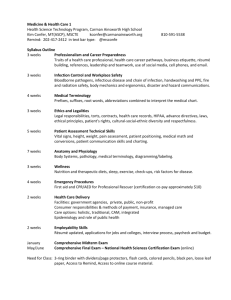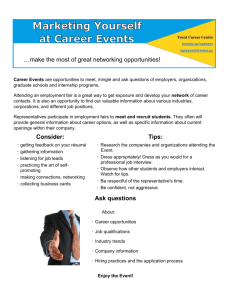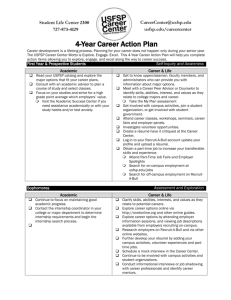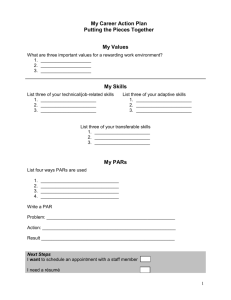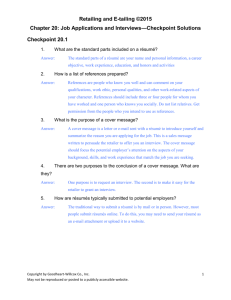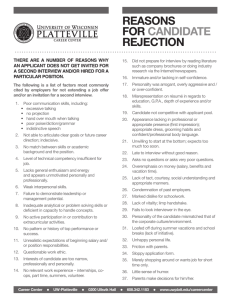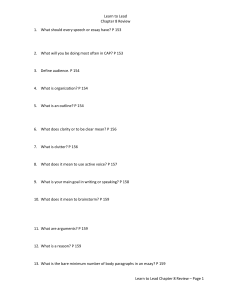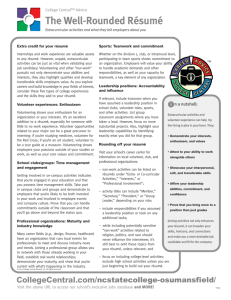4-Job-Search -RESOURCE-CENTRE -BINDER
advertisement
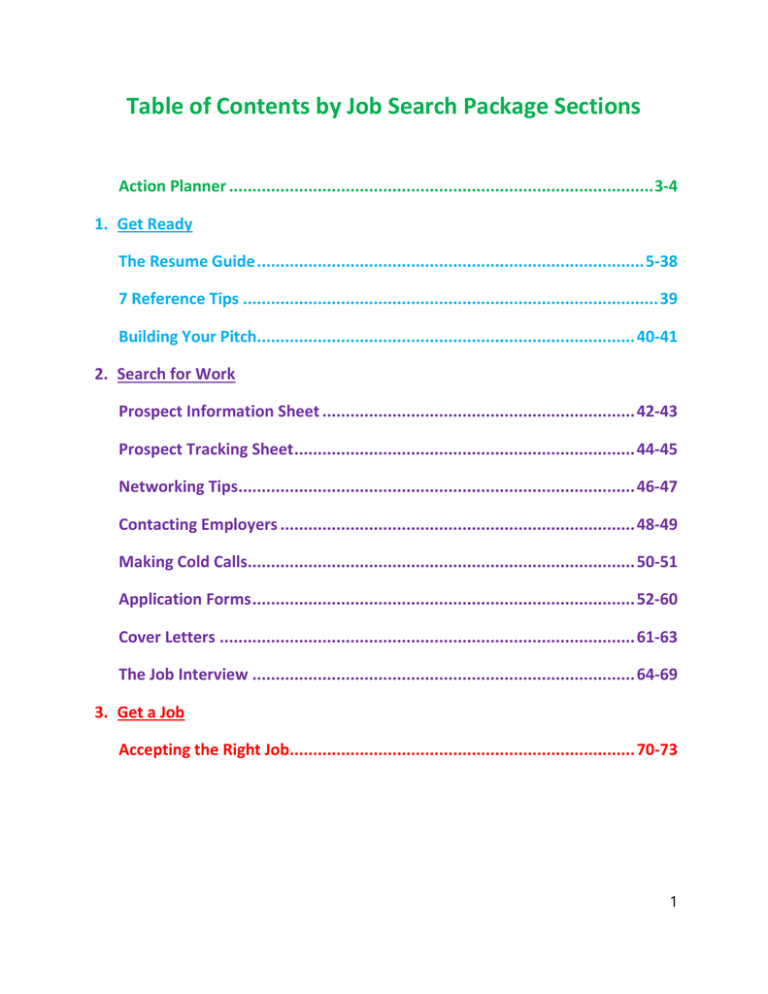
Table of Contents by Job Search Package Sections Action Planner ........................................................................................... 3-4 1. Get Ready The Resume Guide ................................................................................... 5-38 7 Reference Tips ......................................................................................... 39 Building Your Pitch................................................................................. 40-41 2. Search for Work Prospect Information Sheet ................................................................... 42-43 Prospect Tracking Sheet ......................................................................... 44-45 Networking Tips..................................................................................... 46-47 Contacting Employers ............................................................................ 48-49 Making Cold Calls................................................................................... 50-51 Application Forms .................................................................................. 52-60 Cover Letters ......................................................................................... 61-63 The Job Interview .................................................................................. 64-69 3. Get a Job Accepting the Right Job.......................................................................... 70-73 1 Alphabetical Table of Contents (Handouts listed alphabetically) 7 Reference Tips ...................................................................................................39 Accepting the Right Job .................................................................................. 70-73 Action Planner .................................................................................................... 3-4 Application Forms ........................................................................................... 52-60 Building Your Pitch .......................................................................................... 40-41 Contacting Employers ..................................................................................... 48-49 Cover Letters .................................................................................................. 61-63 Making Cold Calls ............................................................................................ 50-51 Networking Tips .............................................................................................. 46-47 Prospect Information Sheet ............................................................................ 42-43 Prospect Tracking Sheet.................................................................................. 44-45 The Job Interview............................................................................................ 64-69 The Resume Guide ............................................................................................ 5-38 2 ACTION PLANNER Goal: Steps 01 02 03 04 05 06 07 08 09 10 Done To Do Allies* How? When? Progress * Who can help you with this? 3 Goal: Steps 11 12 13 14 15 16 17 18 19 20 Done To Do Allies* How? When? Progress * Who can help you with this? 4 THE RÉSUMÉ GUIDE TIP: Employers want to meet the same person they read about on paper. It is important that you provide a true reflection of yourself. There are several different types of résumés. Each one has specific advantages and disadvantages. This guide will help you to choose the one that is best suited to you and your situation. Whatever type of résumé you choose, however, the first step is to have a current and complete list of your skills, education, training, work and volunteer experience. Complete these charts as fully as you can. The information you record will give you everything you need to create a winning résumé. 5 Work History List from most recent to least recent Position Company/Organization City Year 6 Education List from most recent to least recent Degree, Diploma or Certificate Institution/School City Year 7 Training List from most recent to least recent Courses Institution/School City Year 8 Volunteer/Community Involvement: List from most recent to least recent City Position Organization Year 9 SKILLS This is the most important section. It is the part employers will typically pay most attention to. Skills are things you can do well. Very often, we underestimate what we can do. The following pages will help you to think about your past experience and find words to describe your skills. As you complete the next pages, identify as many skills as you think you have. TIP: Ask yourself if you could provide one example of how you used a skill you select. If you can think of a concrete example, you have the skill! Use this guide to help you to identify Job Related Skills. These are skills you have used in your past work experience (paid, unpaid or volunteer). If you have trouble finding the right words to describe your Job Related Skills, you can refer to the skill lists provided. Use this guide to also help you identify your Transferable Skills. These are important because they are skills you can use in many different jobs. Finally, use the Summary Sheets to record your strongest/favourite Transferable Skills and your key Job Related Skills. 10 JOB RELATED SKILLS Job related skills are the skills you have used in specific work you’ve done. For example: An office worker needs computer and keyboarding skills; A mechanic needs to know how to use tools; and A cashier needs to know how to make change. Job Related Skills can be built through training, paid work experience, volunteer work or work you’ve done in your home or community. Recall the duties, tasks or responsibilities you’ve had in various jobs. Then you’ll be asked to identify the skills you had to have in order to do those duties. TIP: Use “skill sentences” to describe your skills. A skill sentence starts off with an action verb – something you actually did. These stand out to employers looking at your résumé because they not only say clearly what you can do, but also provide “proof” of when you did it. 11 Here’s an example of what we’re asking you to do: Work: Server at Flo’s Coffee Shop Duties , tasks or responsibilities Baker Server - coffees and teas Skills sentences Followed complex instructions and schedule Used complex equipment Cashier Made change accurately Balanced the day’s receipts Customer Service Manage long line ups Received employee of the month award for providing friendly and quality service Managed long line ups and pressure situations Responded professionally to customer complaints 12 YOUR JOB RELATED SKILLS Make as many copies of this page as you need. Work/volunteer/learning experience you’ve had: __________________________ Duties , tasks or responsibilities Skills sentences 13 SKILLS LISTS (Adapted in part from: The Damn Good Resume Guide) Look for job titles that are “close” to some of your work or volunteer experience to find skills that you have. Receptionist Organize files Answer phones Communicate effectively Use Computer Systems Deal with Customer Complaints Professionally Carpenter Calculate Estimate Use Eye-Hand Coordination Sales Representative Present and Market Products/Ideas Effectively Communicate Effectively Develop and Maintain Positive Relationships with Customers Construction Labourer Use Geometry Use Hand-Eye Coordination Be Able to Work Effectively in a Team Follow Instructions Screen Calls/Requests Manage Time Adapt to Change Juggle Many Tasks at Once/Prioritize Work Use Manual Dexterity Be Physically Fit Have Good Balance Apply Effective Sales Techniques Build Strong Networks Present Confidently Be on Time Apply Safety Codes Work Under Variable Conditions Adapt to Change 14 Accountant Manage Bookkeeping Operate Computerized Accounting Systems Pay Attention to Detail Substitute Teacher Teach Children/Adults Plan Organize Give Clear Instructions Be Sensitive to Cultural/Racial Differences Marketing and Public Relations Promote an Idea or Product Assess Potential Markets Relate to the Public Respond to Complaints/Concerns Professionally School Counsellor Counsel Individuals Administer Tests/Evaluations Facilitate Groups Listen Effectively Cleaner Read Instructions and Labels Relate Professionally to Customers Work Safely Estimate Work with Precision and Accuracy Be Responsible Be Flexible Adapt to Change Follow a Schedule Manage Time Accurately Assess Limits of Competence/Responsibility Communicate Professionally Demonstrate Sound Judgement Apply Codes of Confidentiality and Appropriate Conduct Measure Be Responsible Follow a Schedule Manage Time Customer Service 15 Research Chemist Apply Quality Control Standards Manage Projects Program Developer Administer Budgets Assess Community Needs Organize Information/Ideas in Sequence Massage Therapist Administer Non-Invasive Pain Control Apply Sport Massage/Sports Therapy Techniques Mediator Actively Listen Provide Feedback Analyze and Organize Information Fitness Consultant Apply Training Techniques Consult with Individuals Assess Needs Design Tailored Fitness Programs Private Investigator Identify Relevant Information Interview Sources Demonstrate Good Judgement Respect Confidentiality Analyze Data Read Instrumentation Build and Maintain a Network Manage People and Tasks Assess Needs Educate Clients Develop Professional Affiliations Promote Referrals Summarize Information/Ideas Resolve Conflicts Teach/Educate Clients Teach Clients Motivate Clients Manage Time Follow a Schedule Investigate Leads Work Safely Work Independently 16 Union Business Agent Negotiate Contracts Deal Professionally with Grievances Interpret and Enforce Contracts Organize Workers Administer Rules/Regulations Information Specialist Analyze Information Needs Advise Clients Research Write Manage Data Fire Fighter Evaluate Risk/Safety Manage Crisis Situations Respond Accurately and Quickly Implement Safety Regulations Follow Instructions; Use Equipment Parish Minister Counsel Parishioners Deliver Pastoral Services Deliver Religious Education Adapt to Change Administer Medical Interventions Work Effectively with a Team Be Reliable Deal Effectively with the Public Plan and Execute Worship Services Administer Parish Office Manage Staff and Committees Wardrobe Assistant Follow a Schedule Manage Appointments Ensure Inventory Levels Maintain/Repair Costumes Regional Planner Assess Land Use Assess Economic Impacts Set Priorities Prepare and Present Plans Sew Manage Accounts Shop for Supplies Anticipate Needs 17 Assistant Manager Trainee Develop and Maintain Positive Relations with Staff Apply Rules/Regulations Fairly Communicate Clearly Be Responsible and Reliable Understand All Job Duties Provide Staff with Appropriate Support and Supervision Manage Money/Budgets Report to Manager Truck Driver Manage Time Record Information Accurately Adapt to Changing Conditions Apply Safety Rules/Regulations Work Independently Maintain Alertness Under Difficult Conditions Assess Risk Use Sound Judgement Cashier Calculate Change Use Equipment Balance Day’s Receipts Deal Professionally with Customer Complaints Work Independently Listen Pay Attention to Detail Be Responsible and Reliable Follow a Schedule Deal with Multiple Demands 18 Communication Skills Creative Skills Research Skills Advise Approach Assess Clarify Communicate Define Identify Influence Inform Interpret Interview Market Negotiate Persuade Perceive Promote Arrange Act Conceive Cook Create Demonstrate Design Develop Devise Draft Generate Forecast Improvise Innovate Invent Modify Perform Produce Predict Re-design Present Publish Publicize Read Record Sell Speak Supervise Summarize Talk Teach Train Translate Transmit Write Information & Number Skills Analyze Budget Calculate Catalogue Check Compare Compile Edit Estimate Examine Evaluate Exchange Familiarize Index Inspect Investigate Manipulate Memorize Organize Process Program Qualify Reconcile Report Research Review Scan Schedule Screen Select Standardize Survey Synthesize Systematize Verify Manual & Mechanical Skills Adjust Apply Assemble Build Construct Contract Detail Distribute Handle Install Operate Produce Repair Service People Skills Aid Assist Collaborate Consult Co-operate Correct Counsel Enforce Exhibit Encourage Enlist Instruct Mediate Moderate Renew Resolve Serve Support 19 Results-Oriented Skills Accomplish Achieve Adapt Advertise Assign Attain Complete Contribute Delegate Decrease Double Eliminate Employ Enlarge Establish Execute Expand Expedite Formulate Furnish Govern Head Hire Improve Increase Introduce Maintain Multiply Obtain Open Prepare Propose Provide Realize Recommend Rectify Reduce Revamp Reorganize Revise Revitalize Risk Save Settle Simplify Sell Solve Staff Stimulate Streamline Strengthen Structure Submit Succeed Summarize Transfer Troubleshoot Uncover Unify Update Upgrade Utilize Widen Win 20 YOUR TRANSFERABLE SKILLS You not only have Job Related Skills. You also have “Transferable Skills”. Transferable skills are the skills you've developed through life experiences that can be used in your next job or new career. You can develop Transferable Skills in many different ways: from paid work, unpaid work, volunteering, parenting, and through hobbies. Here is a list of transferable skills. Check off as many as you have… and remember, don’t be modest! Key Skills: I can… Meet deadlines Supervise others Solve problems Teach others and give clear instructions Manage people Organize and manage projects Speak in public Accept responsibility Plan daily work, or special events Hands-on Skills: I can… Assemble kits Build or repair things Work well with my hands Operate tools, machinery or vehicles Use complex equipment Drive or operate vehicles Inspect and maintain equipment Data/information Skills: I can… Make a budget, manage money Record facts, classify information by date Analyze data, audit and maintain records Check information for accuracy Pay attention to details Investigate and clarify results Locate answers, gather information Calculate or compute Evaluate Take inventory Keep financial records Research and write reports 21 People Skills: I can… Help and care for others Manage conflicts, resolve issues Counsel people Be tactful and diplomatic Interview people Be kind and understanding Be a good listener Negotiate Be outgoing Show patience Be pleasant and sociable Supervise, teach Be tough when necessary Trust people, my instincts Verbal/Communication Skills: I can… Clearly express myself Talk easily with others Create and talk about new ideas Design presentations Be inventive Conduct research in a library or on the Internet Set up my own network of experts, or helpers Be logical Speak in public Write clear and concise reports Work well with others Creative/Artistic Skills: I can… Be artistic Write short stories or articles Draw or create other art Express myself through music, poetry or art Design posters, draw cartoons and illustrations Perform and act Present artistic ideas Dance, create body movement Use computers to create presentations Design and layout web pages Achieve high scores in video games 22 Leadership Skills: I can… Arrange meetings or social functions Be competitive when necessary Make decisions Direct the work of others Help set goals for my team Explain things to others Solve problems Motivate people Settle disagreements Plan activities and put them into action Take risks when necessary Organize and chair a meeting Show self-confidence Personal Skills: I am… Accurate Adaptable Adventurous Alert Ambitious Amiable Analytical Articulate Assertive Broad-minded Calm Capable Careful Cautious Charitable Cheerful Compassionate Competent Competitive Confident Conscientious Considerate Consistent Constructive Cool-headed Cooperative Courageous Courteous Creative Curious Decisive Dedicated Dependable Determined Disciplined Discreet Easy-going Efficient Energetic Enterprising Flexible Forceful Friendly Generous Hard-working Helpful Honest Humorous Imaginative Independent Industrious Innovative Introspective Logical Loyal Mature Meticulous Motivating Objective Obliging Open-minded Optimistic Original Organized Outgoing Patient People-oriented Persistent Perceptive Positive Practical Productive 23 Personal Skills (continued): I am… Professional Progressive Prudent Punctual Quick Realistic Reliable Resourceful Responsible Self-confident Self-reliant Sensitive Sincere Sociable Spontaneous Stable Steady Supportive Systematic Tactful Thoughtful Tolerant Trustworthy Versatile 24 SUMMARY SHEET: TRANSFERABLE SKILLS Transferable skills are the skills you developed through jobs, volunteer work, hobbies, sports, or other life experiences that can be used in your next job or new career. Now it’s time to identify your most important Transferable Skills – the ones you want to continue to use in your next job. These will be the skills you want to highlight in your résumé and professional pitch. Look back over the transferable skills you circled. Decide which ones you think are your strongest and which ones are your favourites (i.e. you enjoy using the most). Sometimes these will be the same, but not always. 5 STRONGEST TRANSFERABLE SKILLS 5 FAVOURITE TRANSFERABLE SKILLS 1. 1. 2. 2. 3. 3. 4. 4. 5. 5. 25 SUMMARY SHEET: JOB RELATED SKILLS Now, go back over your job related skills. What Job Related Skills stand out to you as your strongest and favourite (i.e. the ones you enjoyed using the most). 5 STRONGEST JOB RELATED SKILLS 5 FAVOURITE JOB RELATED SKILLS 1. 1. 2. 2. 3. 3. 4. 4. 5. 5. 26 CONGRATULATIONS!! You are now have all the information about yourself you need to create your resume. WHAT IS THE BEST KIND OF RÉSUMÉ FOR YOU? Before you actually create your résumé, you’ll want to decide what type of résumé will work best for you. There are four different types of résumés: Chronological Functional Combination Electronic On the next pages, you’ll find: A description of each type of résumé, including their relative advantages and limitations; AND A sample of each type of résumé. 27 CHRONOLOGICAL RÉSUMÉ A chronological résumé provides a record of your work history and education in sequence (typically from the most recent to the least recent). It has traditionally been the most common résumé format. Advantages of the Chronological Résumé: Employers are very familiar with this format It is fairly easy to develop It highlights steady and/or clearly relevant employment and training It allows employer to easily compare work history and education/training with the job description Disadvantages of the Chronological Résumé: It may show gaps in employment and education history It may not emphasize accomplishments, particularly if these occurred during volunteer work or other extracurricular activities Use a Chronological Résumé if… you don't know much about your prospective employer you have a solid work history with few or no gaps the expectations of job you are applying for is a good match for your work experience and educational background Avoid it when you have… performance problems not advanced or developed on-the-job with your previous work made many job changes had long periods of unemployment have decided to change your career 28 SAMPLE OF CHRONOLOGICAL RÉSUMÉ KELLY THOMPSON 321 Cherry Grove Estates Lansdown, Saskatchewan K0A 3L0 Telephone: 934-9878 OBJECTIVE: To secure a challenging position in Marketing. WORK HISTORY: May 1996 - present Assistant Marketing Agent Vive La Difference Theatre Help the director to organize and implement special events, work on the annual subscription campaign, and promote the theatre through the media by writing press releases. March 1995 – March 1996 Display Assistant Q-Mart Company Arrange merchandise displays to ensure maximum sales, create displays for special promotions and work on set designs for windows. April 1994 – January 1995 Sales Clerk Braydon Dress Shoppe Serve customers, handle cash accurately and prepare bank deposits. EDUCATION: 1993 - 1994 1993 Certificate in Sales Lavoy Business School, Lansdown High School Diploma Collegiate High School, Lansdown OTHER ACTIVITIES: Participate in team sports such as baseball, volleyball, and soccer. Enjoy photography, drawing and design. REFERENCES: Available upon request 29 SKILLS/FUNCTIONAL RÉSUMÉ A skills/functional résumé provides a record of your skills and accomplishments, but does not include a record of dates. This résumé highlights your skills and abilities rather than your work history (actual jobs/positions held). If there are gaps in your employment history (ex. you are trying to find work after a long period of unemployment, being in prison or a significant period of illness), or you have minimal work experience, this may be a better format than the chronological résumé format for you. Advantages of the Skills/Functional Résumé: It may be preferable if your past employment/education is not related to the type of work your searching for now If you don’t have much work experience, you can demonstrate skills you’ve learned in other settings It emphasizes transferable skills Disadvantages of the Skills/Functional Résumé: It’s often more difficult to develop this type of résumé The absence of dates may generate suspicion from employers since employers are not as familiar with this format Use a Skills/Functional Résumé when… You have held several unrelated jobs and/or have changed jobs frequently The position you are applying for not in line with your past work experience or education/training There are long gaps between jobs in your work history Your career has taken a number of turns You are re-entering the workforce after being unemployed for a long time You have little formal work history and/or education 30 SAMPLE OF SKILLS/FUNCTIONAL RÉSUMÉ SALLY JAMES 220 King Street Kings Place Fredericton, NB E3B 5H8 Tel: (506) 458-9969 SKILLS Administrative and Organizational plan itineraries and schedule travel arrangements plan and coordinate meetings and agendas design functional filing system answer phones and direct calls effectively Communications and Human Relations liaise with employees and supervisors interact with government officials, clients, employees and volunteers use e-mail and a variety of software programs Writing and Research conduct Internet research on any topic write up reports with notes provided by supervisor serve as committee member for writing the staff newsletter WORK HISTORY Summer Student at the Boys and Girls Club Headquarters, Fredericton Administrative Assistant at the Volunteer Action Centre, Fredericton EDUCATION High school upgrading courses First Aid and CPR Training Numerous courses on computer application REFERENCES AVAILABLE UPON REQUEST 31 COMBINATION RÉSUMÉ A combination résumé combines both the chronological and skills/functional résumé, highlighting relevant skills and accomplishments and providing a sequential listing of employment and education. If you want to emphasize strong skills and a solid work history, this is likely the best format to use. Advantages of the Combination Résumé: It presents a more complete picture It highlights both skills and employment/education history It includes dates, which is information employers often want to see Disadvantages of the Combination Résumé: It can be a bit more work to do well It may get lengthy It will show gaps in dates if you have periods of unemployment Use a Combination Résumé when… You want to highlight your transferable skills You have a consistent work history with demonstrated growth You have nothing you want to de-emphasize 32 SAMPLE OF COMBINATION RÉSUMÉ TERRY MALONE 8222 Rayborn Street Furrow, Alberta T0L 3E4 Telephone: (403) 989-4545 Fax: (403) 999-5454 Objective: To obtain work as an apprentice welder. Qualifications Experience in severing, clamping and electric welding metals in piping and beams Possess basic knowledge of materials and construction Possess above average mechanical skills and interest Experience in checking for defects and cleaning metals before welding Certified in First Aid and CPR Personal Attributes Able to work well with little supervision Strong manual dexterity and excellent endurance Able to work carefully with attention to detail but still maintain deadlines Patient, honest, communicate well and work as part of a team Work History Apprentice Welder ATO Company, Calgary, Alberta February 1998 – March 1999 Labourer Freeman Warehouse, Furrow, Alberta October 1996 - October 1997 Education Grade 12, 1996 Furrow Senior High School, Furrow, Alberta References: Available Upon Request 33 ELECTRONIC RÉSUMÉ An Electronic Résumé can follow any of the 3 styles previously described. The big difference is that it is built specifically so it can be easily scanned into an electronic résumé tracking system. This means it must be quite plain, include no graphics and use no italics, text boxes or non-standard font sizes/types. Once your electronic résumé is scanned into the tracking system, it can be retrieved by the company you’re applying to. They will scan it for key words that are important to the job they’re trying to fill. The more of these words your résumé includes, the more likely you will be chosen as a possible candidate. You can either incorporate key word nouns into the body of your résumé, or you can write a key word summary to describe your qualifications. Some web sites (such as WINWAY or Career Cruising) allow you to build your electronic résumé online. Advantages of the Electronic Résumé: It allows flexibility with respect to choosing any of the three previous formats If used in combination with hard copy, it increases the exposure of the résumé (particularly in the high tech field) by tapping into résumé tracking systems The use of appropriate key words can lead to matches that fit your skills/preferences Disadvantages of the Electronic Résumé: Graphic/Design features are typically lost, so these cannot be used to enhance the appeal of the résumé Choosing the “right” key words can be tricky – Companies, even within the same sector, may not be consistent with respect to the words they use to flag résumés If used in isolation, the exposure may be limited as many sectors do not use résumé tracking systems 34 Use an Electronic Résumé when… You want to post your résumé on an electronic job bank You are applying for jobs in the high-tech sector You are using WINWAY, Career Cruising or another résumé writing website to guide the formatting of your electronic résumé 35 WRITING YOUR RÉSUMÉ Now that you have chosen the best résumé style for you, you are ready to go! Get a blank sheet of paper (or open a Word document on your computer). You’ll want to have the information you recorded about yourself from this guide in front of you. When you are writing your résumé, think of commercials or ads. The ones that really grab you are often short and to the point and they give only relevant positive information. With your résumé, you are creating a commercial about yourself. A good résumé will sell you to employers! Depending on the format you’ve chosen, here’s a summary of key résumé sections: Highlights of Qualifications/Skills: This can also be titled: Summary, Highlights or Profile. This section of your résumé gives the employer a quick summary of your relevant experience, skills, formal training and/or credentials. It may include one significant accomplishment and/or 1-2 special skills or abilities that are related to your work objective. You can also make reference to values that are important to you, your commitment or philosophy if appropriate. Relevant Skills and Experience: This may also be titled: Talents, Accomplishments, Achievements, Strengths, Areas of Effectiveness, Professional Attributes, Results Achieved, or Capabilities. This section should focus on action words and measurable accomplishments. The value or benefit you bring to the company/organization should be described, as well as activities you want to do in the future that are relevant to the job to which you are applying. 36 Employment History: This may also be titled Employment, Employment Background, Employment History, Work History, Work Experience, Professional Experience, Career Experience, Experience Highlights or Experience Background. This may include paid, volunteer, contract or part-time work, or work placements. The job title, name of organization, city, province and start/end dates should be included. Educational History: This may also be titled Educational Highlights, Education and Training, Education Background, Education and Development or Educational Development. This section should include your education and training that is relevant to the work you’re seeking. It should include schools attended, with the date of program completion. Workshops, training courses, certificate programs and other relevant credentials may be added. Interests: This may also be titled Hobbies, Leisure Activities or Recreation and Leisure Interests. This section is optional and should focus on activities that have relevance to the work being sought. Volunteer Work: This may also be titled Community Activities, Community Involvement or Leadership Roles. This may fit into Work Experience (above) or it may have its own heading. 37 CHEAT SHEETS You can use the following to find appropriate words to describe your qualifications, professional experience and skills. Years/amount of experience in work being sought: Extensive experience maintaining… X years experience in … Solid X experience… Strong background in … Level/type of relevant education and/or training, memberships or associations: Formal education and training in… Diploma in …; Member of…; Certified in… Knowledge/Strengths that will be most of interest to employers: Knowledge of various business software programs Creative in cutting costs and solving problems Proficiency in a variety of … systems Able to quickly master new software and apply its full range of capabilities Self-management/Other relevant ability: Work well in a busy office handling a wide variety of tasks Self-motivated, adaptable and cooperative Disciplined and well organized Always find ways of doing things better Strong will to learn quickly Strong interpersonal skills and proven ability to provide excellent customer service Exceptionally organized and resourceful, with a wide range of skills Motivated to meet clients’ needs and achieve success (independently and within a team) Strong attention to detail Self-management/Other relevant ability (continued): Developed a trusting relationship with employers and employees Always practice safety first 38 Proven to be responsible and professional in dealing with staff and the public Quick learner and ability to adapt quickly to a challenge Committed to excellent service and client satisfaction Dependable in completing high accuracy work Take pride in achieving the best possible results Work equally well as a team member or independently Ability to work in a high stress environment Dedicated with a positive attitude Works well in an independent environment Sincerely enjoy helping and providing customer service Languages: Communicate fluently in both official languages Good English communication skills Communicate well with a wide range of personalities Highlights: Remember that employers will often read this section only. Therefore, in a nutshell, you want to address where you ‘shine’ – what are the highlights of how you qualify and what will you bring to the job. Some examples are: Bachelor’s Degree in Journalism Solid experience in planning, organizing and coordinating local music festivals Highly motivated by a fast-paced environment Excellent communication skills in both official languages 39 7 Reference Tips 1. Identify three or more people you can use as references. If you have only three references, two of these should be former employers or people who are familiar with your paid or volunteer work and your work ethics. DO NOT USE RELATIVES. 2. If your previous supervisor would not be a positive reference, try to use a coworker or another supervisor who is familiar with your work. 3. Always ask permission before writing their name as a reference on your résumé. 4. Ask your references what they would say about you in order to determine if they know you well enough to sell your strengths to a prospective employer. 5. Ensure your references always have an up-to-date copy of your résumé. 6. Whenever possible, prior to an interview, inform your references of the position you have applied for and the names of the company and the interviewer. 7. Keep your references informed about your work search. Ask for their feedback and thank them each time they provide you with a reference. 40 BUILDING YOUR PITCH The purpose of the pitch is to give (in about 30 seconds) a strong impression of: Your relevant skills/strengths; and What value/benefits you can bring to the employer. You want whoever you are speaking with to go away thinking: “We should talk to this person more!” “This person is an interesting prospect for the job!” Pitch Elements Most important thing employer must know about you Example I am a customer service rep with 5 yrs experience 2nd most important thing about you I am a strong team player 3rd most important thing about you I am a good problem solver SAMPLE PITCH “I have five years’ experience in customer service. I am a team player and can handle situations with a win-win approach. I understand your company has high values in customer service and would love a chance to discuss ways I could contribute to your company.” 41 DEVELOPING YOUR PITCH When developing your pitch, ask yourself: “What is the most important thing that I want the employer to know about me?” Break your pitch down into 4 parts: 1. Opening Statement: The opening of the pitch should be a positioning statement. It should focus on the field you are hoping to work in. For example, “I’m a sanitation engineer.” 2. Follow Up Statement: The pitch should then include the second most important thing you want the employer to know. This thought should separate you from all the other candidates, such as, “with 10 years of front-line and 5 years of supervisory experience.” 3. Statement of Accomplishment: The third element of the pitch is a statement of accomplishment – one thing you did well and can give an example of. Avoid too much detail. Details can wait for an actual job interview. Example: “My experience includes safety planning and scheduling. I wrote a successful work safety plan for my division.” 4. Final Statement: The final statement in the pitch can be something like; “I’m excited about talking to you today (or someone who is hiring) because of the strong work safety component of your business.” TIP: It is a very good idea to practice your pitch out loud, in front of a mirror. Only you will see you. Better still, a 42 43 PROSPECT INFORMATION SHEET The Job: Where I found out about it: Name/Contact information for company: Specific skills required: Specific employment or educational background required: Wage or Salary Offered: 44 Benefits Provided: PROSPECT INFORMATION SHEET (Continued) Size of Organization: Company Culture (dress code, working hours, supervision, etc): Advancement Opportunities or Related Opportunities in the Company: How to Apply (type of resume, cover letter, application, etc): Why this job is or is not a good “fit “ for me: 45 46 PROSPECT TRACKING SHEET Company Name and Contact Information (address, phone, fax and e-mail) Job Title/ Position Being Sought Name of Contact Person Contacts Contacts Type of Contact Date of (phone, face-to- Contact face, interview…) Contacts Follow Up Steps After Co 1. 2. 3. 4. 5. 1. 2. 3. 4. 5. 1. 47 Company Name and Contact Information (address, phone, fax and e-mail) Job Title/ Position Being Sought Name of Contact Person Contacts Contacts Type of Contact Date of (phone, face-to- Contact face, interview…) Contacts Follow Up Steps After Co 2. 3. 4. 5. 1. 2. 3. 4. 5. 48 NETWORKING TIPS Talk to 2 of your friends and find out about their jobs. Contact past employers and ask for their advice. Talk to a family member and find out about their present job. Read the newspaper cover to cover and answer help wanted and read articles about any new developments and projects. Follow-up to get more information if something interests you. Strike up a conversation with a stranger. Never start by talking about yourself. Keep the conversation short and focused. The objective is to get your new acquaintance to talk. Talk to a previous co-worker and update them on your situation. You may choose to ask them for a reference letter. Attend a public meeting (ex. Chamber of Commerce, Community Centre, Church social) and talk to at least one person about your work objective. Ask 3 people who know you well for 3 names of people you could speak to about job leads. Join an association or an organization that interests you. Volunteer. 49 Check bulletin boards, store signage and look for help wanted signs in windows. Find a company in your field. Ask if you can meet with someone within the company to find out about current developments and priorities in the field. Find out where key people in your industry of choice meet to socialize. Use directories (phone book, Chamber of Commerce) to identify 5 companies you want to target. Call each one and find out the name of the person responsible for hiring. Call your references. Update them on your present search and, if appropriate, ask for a reference letter. Go to a public office building and look at the bulletin board to get information about one company. Make a list of all the people you see daily (family, neighbours), weekly (grocery store clerk, bus driver and friends), monthly (bank teller, pharmacist) and occasionally (acquaintances, past co-workers, doctor or dentist). Talk to 2 people about their work conditions (hours, benefits, vacation, salary range…). Talk to someone in your field and ask them: “What’s up and coming in the future in this field?” Talk to 1-2 people currently working in a company of interest (not managers or HR people). Ask them to tell you what they do and how they got there. Keep track of every networking opportunity you actually try and record the result. 50 Make a commitment to make at least 2 contacts per day: face-to-face, by phone or by e-mail. 51 CONTACTING EMPLOYERS IN PERSON: ADVANTAGES Most effective for low to medium skilled and some sales-related jobs Impress employers who are looking for outgoing people Favourable first impressions can be created by your appearance and professional pitch Successful if employer has an open door policy (no appointments required) DISADVANTAGES Some employers resent the intrusion on their time Takes considerable selfconfidence Time-consuming May involve costs for transportation In most cases employers prefer appointments (which requires telephone calls) BY TELEPHONE: ADVANTAGES Gather information faster and easier Can contact many employers in a short time, save money DISADVANTAGES Requires good telephone skills which can be developed through practice Only have one minute to 52 Harder to ignore than a letter Can be effective for most types of jobs May be able to directly talk to the person hiring convince an employer to talk to you BY MAIL: ADVANTAGES Emphasizes good qualifications May be more practical for someone who is still employed Time and cost effective for out of town employers. DISADVANTAGES Receives a maximum of 5 to 10% rate of response from employers Not as effective in competitive fields Time-consuming Waste of time if not well written Cost of supplies and postage BY E-MAIL: ADVANTAGES Effective for technological jobs Useful if already employed DISADVANTAGES Requires your own e-mail address for replies Not all employers have e-mail 53 New method of contact, therefore little information on successful results 54 MAKING COLD CALLS Chances are that some of your job search will involve talking to potential employers on the phone. Most people do not find it easy to talk to strangers in order to get information or the present themselves for employment. Before you get on the phone with a potential employer, you might want to practice first, starting in low risk/low stress situations (like calling friends and acquaintances or employers you’re not planning on approaching for a job). The more you do these kinds of informal cold calls, the more comfortable you will become about making cold calls to employers. Here are 7 key steps to preparing for the cold call: 1. Before calling, be sure you’re clear about the PURPOSE of each call and prepare accordingly. For example: Calling to get the name of the person responsible for hiring Calling to get permission to hand deliver resume Calling to gather information on the company Calling to meet with network contact Calling to get information on advertised job posting 2. Have pen and paper, agenda and resume at hand. 3. Sit up straight, smile, pay attention to tone of voice. It sounds silly, but you’d be surprised what a difference it makes! 4. Practice makes perfect: call yourself and leave messages on voice mail to hear yourself. 5. Expect to call a company 7 to 8 times before you land a meeting. 55 6. Establish a secondary goal for the call if the person can’t speak or meet with you. 7. 10 phone calls = 1 meeting: Make more than 1 phone call!! TIP: BE PREPARED FOR 4 POSSIBILITIES WHEN COLD CALLING Speak directly to person contact Voice mail Potential contact/Receptionist Refusal 6 STEPS TO TELEPHONE SUCCESS FOR CLIENTS 1. Greet the person, state your name and purpose of the call 2. Get name of secretary and contact person with correct spelling 3. Respond assertively, respectfully and politely 4. Give brief summary of your skills 5. Repeat any agreements made 6. Thank the person 56 Record all information in your Prospect Tracking Sheet after each call and be sure your consider follow up steps. 57 APPLICATION FORMS Purpose of Application Forms The employer uses application forms to screen and evaluate: Your reading and writing comprehension skills; Your ability to correctly follow written directions; Your capacity to use correct spelling and grammar; Your work history, stability and reliability; and Your neatness, accuracy and ability to provide detailed information. TIPS FOR EFFECTIVE APPLICATION FORMS Find out how the prospective employer likes to receive applications (in person, by fax, regular mail or by e-mail). Taking the time to check out an employer’s preference and following this makes a good first impression and is a relatively easy cold call to make. Carry a completed sample with you (see page XX). Have a good chronological record of their work/education experiences – It will make filling out applications much easier! Prepare your answers about why you left previous employment in advance. Have a paragraph prepared on why the employer should hire you. Read the whole form first. Take your time. Remember that well-completed forms will impress employers. Carefully proof-read your application or, if possible, have someone else proof-read it. 58 Ensure that original is neatly printed. Use a separate sheet of paper if there is not enough room on the form. Attach a resume but be sure to fill out the form unless otherwise stated. Know your employment preferences: position, hours, shifts, full/part time/casual work, etc. Keep the employer’s needs/position requirements in mind when describing assets, strengths and job related skills. Keep the tone of your answers positive. Under past salary write: “going rate” or “according to scale”. Under salary required write: “negotiable”, “going rate” or know the salary range. Be accurate; dates, education, past employment, addresses can be checked. Put N/A or a check mark for information you do not want to give (age, weight, SIN, health, etc.) Put N/A or a check mark for application form sections that do not apply to you. Don’t leave any blanks on the form. If asked if you are bondable put yes or N/A. Do not put no. Take the application form home if you can so you can take your time in completing it. 59 SAMPLE APPLICATION FORM This includes pretty much every question you could possibly be asked on an application form. Chances are you won’t be asked all of them! Complete this now and always have it with you when completing specific job applications. It will make the job of completing these application forms MUCH easier! Last Name First Home Address Middle City, Province Postal Code Social Ins. # Area Code Telephone ( ) Business Address City, Province Postal Code Area Code Telephone ( ) Next of Kin (Contact For Emergencies) Name Telephone # Home #WorkAddress Relation To You Position applied for: 1st choice 2nd choice Earnings expected: Work Shifts: Day Evening Night Availability: Full Time Part Time Casual On Call Seasonal Co-op __________ Rotation Shifts Contract Summer 1. WORK EXPERIENCE (Please start with your present or last position) 60 A. Firm: City: Address: Province: Postal Code: Kind of business: ____ to:_______________________ Title: ______________ ____ Salary: Phone ( ) Employed from: (Base Bonus _________ Other ) Duties/Responsibilities: May we contact the employer? yes no ____ __ if no why Name & title of immediate supervisor:_________ __ Reasons for leaving or desire to change? ______________________________________________________________________ B. Firm: City: Address: Province: Postal Code: Kind of business: Title: Employed from: Salary: (Base Phone ( ) to: Bonus Other ) Duties/Responsibilities: May we contact the employer? yes if no why no Name & title of immediate Supervisor: 61 Reasons for leaving or desire to change? C. Firm: Address: City: Province: Postal Code: Kind of business: Title: Phone ( ) Employed from: Salary: (Base to: Bonus Other ) Duties/Responsibilities: May we contact the employer? yes no why no if Name & title of immediate Supervisor: Reasons for leaving or desire to change? D. Firm: City: Address: Province: Postal Code: Kind of business: Title: Phone ( ) Employed from: Salary: (Base to: Bonus Other ) Duties/Responsibilities: May we contact the employer? yes if no why no ___ 62 Name & title of immediate Supervisor: Reasons for leaving or desire to change? Other positions held: a. Company a. Your title a. Date (mo/yr) began a. Type of work b. City b. Name of superior b. Date (mo/yr) left Reason for leaving E. a. a. a. _______/_________ a. b. _______/_________ b. a. _______/_________ a. b. _______/_________ b. a. _______/_________ a. b. _______/_________ b. a. _______/_________ a. b. _______/_________ b b. _______/_________ F. a. a. _______/_________ b b. _______/_________ G. a. a. _______/_________ b b. _______/_________ H. a. a. _______/_________ 63 b b. b. _______/_________ b. _______/_________ Are you willing to work over-time? What is your transportation to work? Date available to begin: ______________ If presently employed, how much notice required? ___________________________ Have you ever applied with us? Yes No If yes, where, when? Have you ever worked with us? Yes No If yes, where, when? Optional Section Driving information. Complete this section for warehouse/driving positions only. Please enclose a current copy of your driving record. (Don’t forget to state “N/A” if this section doesn’t apply to you.) List all licenses held: Province Class/Type Expiry Date Yes Have you been denied a license, permit or the privilege to operate a vehicle? No If yes, please explain: 64 Yes No Has any license, permit or privilege ever been suspended or revoked? If yes, please explain: DRIVER EXPERIENCE Class of EquipmentList Type of Equip. Dates From Approx. # KM To Van, Tank, Flat, Etc In Total Straight Truck Tractor & Semi Trailer Tractor-Two Trailers Automobile Other Accident Record for past 3 years (attach sheet if more space is needed) Date City & Prov. Nature Fatalities/Injuri es Amount of Damage Last Previous Previous Clerical Information - Assessment of skills may be required. 10 Key Adding Machine by Touch Yes No 65 Typing - WPM CRT Microfilm Shorthand-WPM Fax Photocopier Personal Computer - Hardware - Software List any other office skills you possess which may be pertinent to this application: 2. EDUCATION (Circle highest grade completed - Proof may be required) A. High School Name of High School: ______ Location: __________________ Dates (mo/yr) attended: __________________ If graduated, month and year: _______ Extra-curricular activities: ________________________________________________________ Honours / Awards / Scholarships: Part-time _ and summer _________________________________________________ _______________ B. College / University / Trade / Business / Technical Name and Location From To Degree Major Extra Curricular Activities, Honors and Awards 66 work: Name instructors most familiar with your studies/work/research: What undergraduate courses did you like most? Why? What undergraduate courses did you like least? Why? Honours/Awards/Scholarships: Part-time and summer work: Other courses, seminars, studies, workshops, certificates, licenses: 3. PHYSICAL DATA Condition of health: _________________________ Date of most recent physical exam: What physical limitations do you have that might have a direct bearing on job performance? List any serious illnesses or accidents you may have had with approximate dates: 4. ACTIVITIES Membership in professional or job-relevant organizations: (You may exclude racial, religious, political and nationality groups) Publications, patents, inventions, professional licenses or special honours or awards: 67 What qualifications, abilities, and strong points will help you succeed in this job? What are your shortcomings and areas for improvement? 5. GOALS What income would you need in order to live the way you would like to live? (Your response will not be taken as dissatisfaction with your present salary, but refers to the salary which you ultimately wish to attain). Willing to relocate? Yes No Any restrictions: If yes, where? (cities, regions, provinces) Amount of overnight travel acceptable: What are your plans for the future? 6. OTHER Other kinds of work for which you are qualified: 68 Good attendance is important to us: last five (5) years: # days absent/late in Reasons for absence/lateness, not related to sickness/injury: List your professional and personal references: ____________________________________ In which official language do you have a working ability? English French Spoken Read Written You are entitled to work in Canada by reason of: Canadian Citizenship Permanent Resident Status Work Permit Are you able to work in any other languages? Have you ever been refused a bond? Yes No If yes, explain: Have you ever been convicted of any offense for which no pardon has been granted? If yes, please explain: Note: a conviction of a crime is not an automatic bar to employment. All circumstances are considered. 69 70 COVER LETTER Here’s the basic format for a cover letter: Applicant's Address City, Province Postal Code Date Employer's Name and Title Company Name Company Address City, Province Postal Code Dear (Employer's Name): Opening (Introduction) - grab the employer's attention! Create interest by using a motivating opening line. State the exact position being sought. Relate when and how you learned about the position. Body (Development) - in one or two short paragraphs, tell the employer how your skills, qualities and qualifications match the requirements of the job. This information should be linked specifically to the job being applied for. You may highlight a particularly relevant accomplishment here. While you don't repeat what you've written in the résumé, you can highlight or re-word experience you have had. Closing (Wrap Up) - ask for an interview and give the employer your specific contact information and availability. Inform the reader that you will be checking back during a defined period of time to set up an appointment. 71 Sincerely, (Signature) COVER LETTER (Sample) Here are a couple of sample cover letters: 227 – 19 Street Creek, any province E0A 5T6 Date Mr. Joe Brown Foreman Joe’s Construction 167 Mall Grand View, any province H6G 7U8 Dear Mr. Brown Please consider my application for the position of construction labourer as advertised on jobopenings.com. I have completed a level 1 carpentry course and have been employed on a seasonal basis over the past 4 years. I have experience using various power tools and pay attention to details such as measurements. My past employment has given me the skills required to work of all stages of construction, including framing, roofing, dry-walling and finishing. I am hard working, reliable and able to work out of town if required. 72 Thanks you for your consideration. Please contact me at (800) 234-5678 to further discuss employment opportunities with Joe’s Construction. Sincerely, John Jobseeker Enclosure COVER LETTER (Sample) 227 – 19 Street Creek, any province E0A 5T6 Date Ms. Betty Smith Staffing Coordinator Staffing Solutions 789 Broad Street Anytown, AnyProvince H6G 7U8 Dear Ms. Smith Please accept this as my application for the Administration Assistant position as advertised in the May 15 edition of the Globe and Mail. 73 I have a diploma in Office Administration. I am proficient in current computer applications and am familiar with a variety of office equipment. Through training and work experience, I have had the opportunity to create written correspondence and possess very good telephone and in person reception skills. Thank you for your consideration. I would be very pleased to have an interview with you. Please contact me at (888) 456-7891. I look forward to hearing from you. Sincerely Alison Jobseeker Enclosure 74 THE JOB INTERVIEW Here are 5 steps that will help you get ready for your job interviews: 1. Find out about the company/organization: Who works there? Who do you know…and who do they know? Visit the company and look around Get the company newsletter Get brochures about their products and/or services Get a job description 2. Memorize five things that you definitely want the interviewer to know about you. Think about each statement: Why is this important to you? Can you think of an example or story that would bring it to life for the employer? 3. Be ready to talk about the past 10 years of your work history or the last 3 jobs you held. Your main responsibilities Your likes and dislikes Your reason(s) for leaving Your supervisor’s opinion of you 4. If past co-workers and supervisors were asked to describe you in 3 words, what words would they use? If you don’t know, find out! 5. Think about the position you are being interviewed for. What are the 5 main areas you think the employer will want to explore? Try to imagine 5 questions you think the employer will ask. For each, plan your answer. Wherever possible, think if examples or stories to support your answers. 75 COMMON INTERVIEW QUESTIONS Prepare your answers to these questions and you’ll be well on your way to a successful interview! 1. Tell me about yourself This is typically one of the first questions in an interview. Suggestions: Talk briefly about: Your qualifications, education and experience related to this position Your strengths, skills and qualities - Why you’re a good person for this job Some appropriate personal information, for example, personal interests or community involvement Plan your answer to the question: “Tell me about yourself”? 2. What is your greatest achievement? Suggestions: Briefly describe a work-related achievement that shows your knowledge, expertise and/or key skills Your answer should include 3 things: the challenge or situation, your action and the results (CAR) Plan your answer to the question: “What is your greatest achievement?” Challenge / Situation: 76 Your Action: The Results: 3. What kind of salary do you need? Suggestions: Unless you know the salary offered, avoid answering with numbers. Politely say: “I am really interested in finding out what salary range you are offering.” OR “The salary is negotiable, but I am sure that we can come to a mutual agreement if you offer me the job.” If the employer is obviously interested in hiring you or insists on an answer, name a range that you know is realistic. Plan your answer to the question: “What salary do you expect?” 4. What are your greatest strengths? Suggestions: 77 Briefly talk about the job-related skills/strengths you can offer (in addition to the work skills, training and experience you’ve already talked about) Provide examples of how you demonstrated these strengths. Plan your answer to the question: “what are your greatest strengths?” 5. What are your weaknesses? Suggestions: State an obvious weakness (like a gap on your resume, needing to learn about new products or not being bilingual). Be sure to describe how you can make up for it so it will not be a problem. Plan your answer to the question: “What are your weaknesses?” 6. Why should we hire you? Suggestions: This is the time to “close the sale”. Give a summary of your key strengths and why you’re a great candidate for this job. If you can, help the employer to imagine you already doing the job and doing it well. For example, you might say: “If you hire me, you will have an employee with knowledge and experience in this field. You will have someone who will serve your clients with professionalism and ensure their satisfaction.” If you only had time to prepare for one question this is the one. Plan your answer to the question: “Why should we hire you?” 78 7. Do you have any questions? Suggestions: Have 3-4 questions prepared before your interview. If you don’t, the employer might think you’re not very interested in the position. It’s also your chance to be sure this job is right for you. Don’t worry about asking permission to look at your notes if you don’t remember your question. Keep questions brief. Show that you have listened to the employer and that you have already researched the company. Ask about job duties, the department, company goals and growth opportunity. Avoid salary/benefit questions. SAMPLE QUESTIONS TO ASK AT A JOB INTERVIEW These questions could be asked, if not previously answered in the interview. I would be interested in learning more about ______ (some aspect of the company’s operations). 79 Who are the people I would be dealing with in this position? What opportunities are there for advancement? Do you have any plans for expansion? When will you be making your decision? What are your company’s biggest challenges? What are the company’s long-term goals? Plan your questions: TIPS FOR THE ACTUAL INTERVIEW DO: Go alone Be neat and well groomed Arrive early (5-10 minutes) Wait to be seated Make eye contact Listen Speak clearly Respond with brief and HONEST answers Thank the interviewer for the opportunity to be interviewed Smile and shake hands and make a graceful exit 80 DON’T: Give long answers Complain about past or present jobs or employers Exaggerate your qualifications Discuss personal problems Linger after the interview WHAT NOW? AFTER THE JOB INTERVIEW After an interview, it’s hard to wait for the answer. Will you be hired or not?? While you’re waiting, it’s important to keep actively searching. Here are suggestions: Follow up with a thank-you letter to your interviewer. Thank them for their time and tell them again that you’re interested in the position. Think about how you did at the interview. Is there anything you would do differently next time? What did you learn from this interview? Make sure you have a fresh list of potential jobs. Use your networks to find hidden jobs. Being active is better than sitting by the phone… and, if you don’t get the job, you’ll have other possibilities on the go. If you have not heard back within two weeks, call to find out what is happening. If they tell you that you did not get the job: o Stay calm. o Ask what you could do in the future to be a stronger candidate. o Ask if they know of any other jobs that might suit you. o Always end with a thank you for the opportunity to be interviewed. o Remember – there are many reasons people don’t get jobs. It isn’t necessarily because you have done anything wrong! 81 o Most people go through several interviews before being hired. Finding a job usually takes weeks and often months. Don’t give up! BUT... If you have tried… and tried… and you’re not getting any offers and are feeling really stuck, ask to see your counsellor at the Employment Resource Centre. 82 ACCEPTING THE RIGHT JOB Before you jump to say yes to the job offer, be sure it’s right for you. Consider: o Hours of work o Benefits o Vacation o Job security o Salary o Your interest in the work o The work environment/atmosphere Remember – nobody gets EVERYTHING they want. BUT, the closer the “fit”, the more likely you’ll succeed at the job long-term. AGREE ON THE TERMS OF EMPLOYMENT First, be clear about what you want: What work conditions do you want? Refer to your mapped objective and have a list. Rank your needs. What: o What do you need to have? o What would you like to have? o What can you give up if you need to? Work from the bottom of your list of needs. Force yourself to give up as many as you can, until you’re left with the most important ones. These are your non-negotiable needs. Look that these “non-negotiable” needs. Which are most important? Which really are at least a little bit “negotiable”? Could you let go of any if you had to? Be well prepared for the meeting where the terms of your employment will be negotiated. The next page has some tips which can help you. 83 NEGOTIATION TIPS Know the salary range for the position. If it’s not included in the job ad, contact people doing this kind of work or look through job ads for similar jobs being offered locally. Have a good understanding of your skills and what you are worth AND know how much money you need monthly. Keep in mind that your pay cheque after taxes will be approximately 25% less. Look at the entire compensation package – not just the salary. Have a minimum salary figure in your head. You don’t have to tell the employer what it is, but it’s good for you to know! Try to let the employer be the first to discuss figures. If the offer is higher than your minimum, accept it. If it is lower, say so but don’t say by how much. In negotiations, a “hmmm” or repeating the number and then silence can really pay off. Don’t negotiate terms over the phone. When you are called with a job offer, ask to meet to discuss the position and the conditions. Never accept or turn down an offer the first time it is made. Ask more questions and gather more information. You can’t negotiate salary after accepting the job. Make sure the employer knows how excited you feel about the new job. Focus on a “win-win” situation. Don’t expect an offer in writing. A letter of agreement can be written after all has been negotiated and you have accepted. If this is not done and you want a written agreement you can write up your own letter and give it to the employer. MAKING THE DECISION Look at the job offer and evaluate it against your: Need to haves; Would like to haves; AND Do not need to haves If you feel really sure, accept the job on the spot and go and celebrate! 84 If you are not sure, ask the employer for 24 or 48 hours to consider everything that has been discussed. If you do this, be sure not to take more than the amount of time agreed to. Call the employer as soon as you have your decision and always follow up with a letter (whether you’re accepting the job or not). Sample letters are provided on the next pages. SAMPLE ACCEPTANCE OF A JOB OFFER I would like to thank you for offering me the position of (name of position) during our meeting on Friday. As you suggested, I took the weekend to consider your offer, and am please to accept its terms. I will be able to begin work with your company on (date). Thank you again for providing me with this opportunity. I am very excited to join your team! 85 SAMPLE REJECTION OF A JOB OFFER I would like to thank you for offering me the position of (name of position) during our meeting on Friday. As you suggested, I took the weekend to consider your offer and, after careful consideration, I have decided not to accept the offer. While the team environment and challenges of the position attracted me, I am delighted to have been offered another position which better meets my personal needs at this time. I hope our paths cross again in the future! Thank you again for providing me with this opportunity. 86
